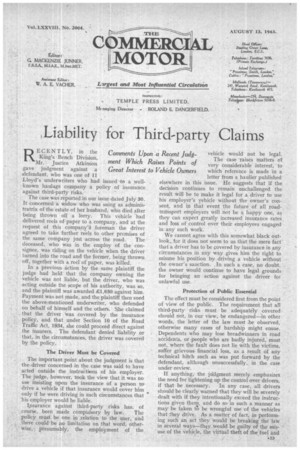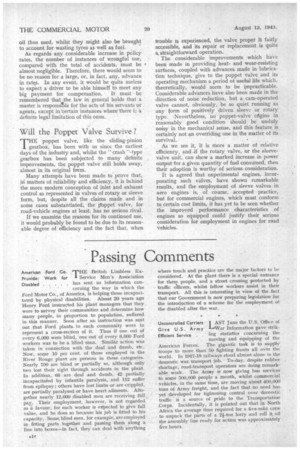,Liability for Third-party Claims
Page 15

Page 16

If you've noticed an error in this article please click here to report it so we can fix it.
RECENTLY, in the King's Bench Division, Mr. Justice Atkinson gave judgment against a defendant, who was one of 11 Lloyd's underwriters who had iSsued to a ',,vell.known haulage company a policy of insurance against third-party risks.
The case was reported in our issue dated July 30. It concerned a widow who was suing as administratrix of the estate of her husband, who died after being throWn off a lorry. This vehicle had delivered reels of paper to a company, and at the request of this company' t foreman the driver agreed to take further reels to other premises of the same company just across the road. The ' deceased, who was in the employ of the consignee, was riding on the vehicle when the driver turned into the road and the former, being thrown off, together with a reel of paper, was killed.
In a previous action by the same plaintiff the judge had held that the company awning the vehicle was not liable, but the driver, who was acting outside the scope of his authority, was so, and theplaintiff was awarded £1,650 against him. .Payment was not made, and the plaintiff then sued the above-mentioned underwriter, who defended on behalf of himself and the others. She claimed that the driver Was covered by the insurance policy, and that under Section 10 of the Road Traffic Act, 1934, she could proceed direct against the insurers. The defendant denied liability or that, in the circumstances, the driver was covered by the policy.
The Driver Must be Covered The important point about the judgment is that thedriver concerned in the case was said to have acted outside the instructions of his employer. The judge, however, took the view that it was no use insisting upon the insurance of a person to drive a vehicle if that insurance would cover him only if he were driving in such circumstances that his employer would be liable.
Ipsurance against third-party risks has, of course, been made compulsory by law. The policy must be one in relation to the user, and there couId•be no limitation on that word, otherwise,presumably, the employment of the vehicle would not be legal. The case raises matters of very considerable interest, to which reference is made in a letter from a haulier published elsewhere in this issue. He suggests that if the decision continues to remain unchallenged the result will be to make it legal for a driver to use his employer's vehicle without the owner's consent, and in that event the future of all roadtrsnsport employers will not be a happy one, as they can expect greatly increased insurance rates and loss of control over their employees engaged in any such work.
We cannot agree with this somewhat black outlook, for it does not seem to us that the mere fact that a driver has to be covered by insurance in any circumstances in any way gives him the right to misuse his position by driving a vehicle without the owner's sanction. .In such a case, no doubt, the owner would continue to have legal grounds for bringing an action against the driver for unlawful use.
Protection of Public Essential The effect must be considered first from the point of view, of the public. The requirement that all third-party risks must be adequately ,covered should not, in our view, be endangered—in other words, the letter of the law must ,be observed; otherwise many cases of hardship might ensue. Dependents who may lose breadwinners in road accidents, or -people who are badly injured, must not, where the fault does not lie with the victims, suffer grievous, financial loss, as a result of any technical hitch such as was put forward by the defendant, although unsuccessfully, in the case under .review.
If anything, the jtfdgment merely emphasizes the need for tightening up the control over drivers, if that be necessary. In any case, all drivers should be clearly warned that they will be severely dealt with if they intentionally exceed the instructions given them, and do so in such a manner as may be taken to be wrongful use of the vehicles that they drive. As a matter of fact, in performing such an act they would be breaking the law in several ways—they would be guilty of the mis' use of the vehicle, the virtual theft of the fuel and oil thus used, whilst they might also be brought to account for wasting tyres as well as fuel. As -regards" any considerable increase in policy rates, the number of instances of wrongful use, compared with the total of accidents, must be almost negligible. Therefore, there would seem to be no reason for a large, or, in fact, any, advance in ratqs. In any event, it would be quite useless to expect a driver to be able himself to meet any big payment for compensation. It must be remembered that the law in general holds that a master is responstle for the acts of his servants or agents, except in *certain instances where there i:. definite legal limitation of this onus.
Will the Poppet Valve Survive ?
THE poppet valve, like the sliding-pinion gearbox, has been with us since the earliest days of the industry and, whilst the "crash "-type gearbox has been subjected to• many definite improvements, the poppet valve still holds sway, almost in its original farm. Many attempts have been made to prove that, in matters ot reliability and efficiency, it is behind the more modern conception of inlet and exhaust control as represented in valves of rotary or sleeve form, but, despite all the claims made and in some cases substantiated, the goppet valve, for road-vehicle engines at least, has no serious rival. If we examilie the reasons for its continued use, it would probably be found to be due to its reasonable degree of efficiency and the fact that, when trouble is experienced, the valve proper it fairly accessible, and its repair or replacement is quite straightforward operation. The considerable improvements which have been made in providing heatand wear-resisting surfaces, coupled with advances made in lubrication technique, give to the poppet Valve and its operating mechanism a period of useful life which, theoretically, would seem to be impracticable. Considerable advances have also been made in the direction of noise reduction, but a cam-operated valve cannot, obviously, be so quiet running as any form of positively driven sleeve or rotary type: -Nevertheless, no poppet-valve crigine in reasonably good condition should be unduly noisy in the mechanical sense, and this feature is certainly not an overriding one in the matter of its survival.. As we• see it, it is more a matter of relative efficiency, and the rotary valve, or the sleevevalve unit, can show a marked increase in power output for a given quantity of fuel consumed, then their adoption is worthy of serious consideration. It is agreed that experimental engines, incorporating such valves, have shown remarkable results, and the employment of sleeve valves in aero engines is, of course, accepted practice, but for commercial engines, which must conform to certain cost limits, it has yet to be seen whether the improved performance characteristics of engines so equipped could justify their serious consideration for employment in engines for road vehicles.




















































